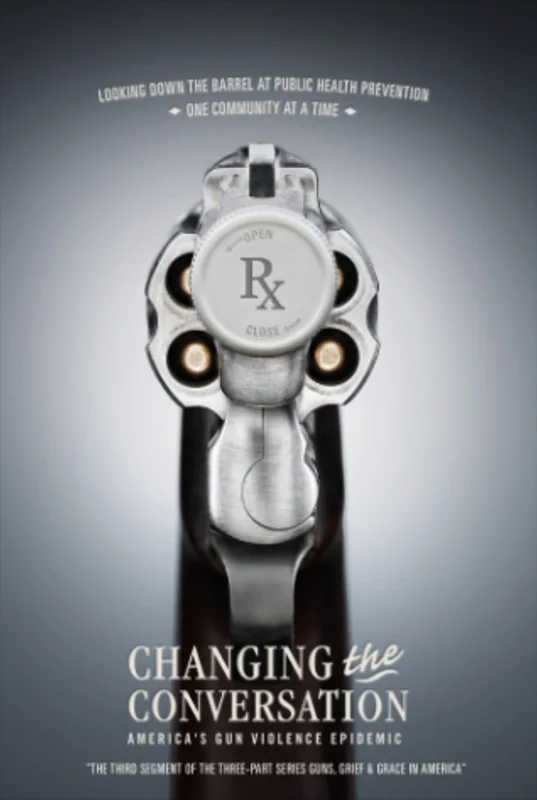Changing the Conversation:
America’s Gun Violence Epidemic
Synopsis—
Looking down the barrel at Public Health Prevention, one community at a time. Part 3 of 3 in the Guns, Grief, and Grace in America series.
Gun violence is generally discussed in terms of urban homicides, yet startling statistics tell another story. Changing the Conversation: America’s Gun Violence Epidemic reframes discussion of America’s gun violence epidemic by shifting from singularly Second Amendment rights to a broader focus of public health prevention. Engage in a radically logical approach to restructure how we think, speak and act on gun violence through three distinct lenses. Hear from lawmakers and activists, urban musicians united for change, and a quiet town searching for answers after a domestic murder-suicide. Featuring experts from the field of public health and a shocking back-room interview with a state senator, Changing the Conversation asks – not can we change the status quo on gun violence, but will we?
Credits—
Director: Janet Fitch
Co-Director: Lajwanti Waghray
Producer: Blyth Renate Meier
Editor: Tate Bunker
Executive Director: Janet Fitch
Screenwriters: Janet Fitch, Tate Bunker, Blyth Renate Meier and Lajwanti Waghray
Videography: Tate Bunker, Mark Escribano, Peter May, Lia Sader, Lajwanti Waghray
Trailer—
The trailer for Changing the Conversation.
Resources—
The Guns, Grief, and Grace in America films are useful and important tools to aid understanding and promote critical thinking and discussion around the complex impact of gun violence on today’s youth and adults alike. The following toolkit and discussion clips are useful to spark and guide dialog as students and community members express their personal responses, thoughts and ideas about the issues and stories presented in the media.
Toolkit—
The toolkit was designed in collaboration with teachers, counselors, social workers, and librarians. Recommended for use in elementary, middle, and high schools; university classrooms; and community organizations.
Part One, “The Old Conversation”—
This 34-minute segment from Changing the Conversation includes the introduction and first segment, "The Old Conversation," set in Madison, Wisconsin. This clip features members of the Wisconsin State Legislature, and Gun Lobby Whistle Blower and Former NRA Assistant General Counsel Robert Ricker. Providing framing from a public health perspective are Stephen Hargarten, MD, MPH (Former Chair of Emergency Medicine and founder of the Comprehensive Injury Center (formerly Firearm Injury Center) at the Medical College of Wisconsin; and Carmen Pitre (President & CEO of Sojourner Family Peace Center).
Part Two, "We Are The Ones"—
This 22-minute segment from Changing the Conversation includes the second segment, "We Are The Ones," set in Milwaukee, Wisconsin. This clip features local activists Rob "Biko" Baker, Muhibb Dyer, and Kwabena Nixon from Campaign Against Violence. Providing framing from a public health perspective are Stephen Hargarten, MD, MPH (Former Chair of Emergency Medicine and founder of the Comprehensive Injury Center (formerly Firearm Injury Center) at the Medical College of Wisconsin; and Carmen Pitre (President & CEO of Sojourner Family Peace Center).
Part Three, "Forgive Us"—
This 31-minute segment from Changing the Conversation includes the third segment, "Forgive Us," set in Marshfield, Wisconsin, and the film’s conclusion. This clip features First Presbyterian Church Reverend Scott Marrese-Wheeler, School Psychologist Becky Lee, UW-Marshfield Associate Dean Julie Tharp, and Marshfield Clinic Psychologist Michael Schulein, PhD. Providing framing from a public health perspective are Stephen Hargarten, MD, MPH (Former Chair of Emergency Medicine and founder of the Comprehensive Injury Center (formerly Firearm Injury Center) at the Medical College of Wisconsin; and Carmen Pitre (President & CEO of Sojourner Family Peace Center).

